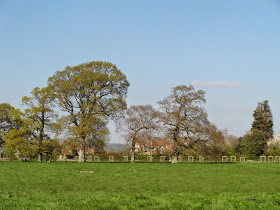Cry 'God for Harry, England and St. George!'
The words of Henry V - according to William Shakespeare. Today might well be St George's day, but there will, I suspect, be precious little sign of it in England, even though St George is our patron saint. The English have a tendency to be undemonstrative; reserved; reticent. We don't take every opportunity to fly our national flag - by which I mean the flag of St George rather than the Union flag. Every public building in France, and quite possibly other European countries as well, flies two flags permanently, the French tricolor and the blue European Union flag with its circle of gold stars. Few private houses in France have flags flying, possibly even fewer than in England and very much fewer than one sees in the USA. As an aside, I seem to recall that one needs planning permission to erect a flagpole in England, which would be a definite turn-off if many English felt inclined to fly the flag.
There is, as always, an exception to the rule. When the England football team is engaged in a competition such as the European Cup or the World Cup, the St George's flag is flown from many cars using those fixings that slip over the top of a window, and hung from many windows. But that seems to bring out the worst in those who already lean to the extreme right-wing politically, the ultra nationalists, and it may well be that some people are worried about being associated with the BNP, the British National Party who, as far as I can tell, have no association with any of the United Kingdoms except England.
Having paid nodding respects to good old George, I will also mention in passing that today is the 450th anniversary of the birth of William Shakespeare. He was both born and died on St george's day, his death being on 23rd April 1616, but as he was born of 23rd April in 1564 some might argue that we should wait until 2nd May to celebrate (or mark) the true 450th anniversary. You see, it was in 1752 that the calendar in Britain was changed from the Julian to the Gregorian. This involved "losing" 11 days; Wednesday 2nd September that year was followed by Thursday 14th. It is said that rioters demanded, "Give us back our eleven days", but this tale is probably apocryphal. The calendar change also altered the financial dates in England. before the change, the financial year had begun on Lady Day, the quarter day marked on 25th March. However, after the loss of 11 days, it was agreed that the new financial year would start on 5th April so that nobody would lose 11 days interest on investments. Another day was skipped in 1800, so from then on the financial year started on 6th April. And it still does.
~~~~~
Having been on the farm for Easter, I do have a few pictures to inflict upon you. First, the farm as seen from across the fields. Those frame-like contraptions are protecting fruit trees planted about three years ago - the new orchard.

Happy St Georges Day BP and how lovely to see an orchard being planted rather than taken down - SD and I went for a walk last night over the hill beyond the farm and he showed me where an orchard used to be that he and his brother played in as children, it's since been replanted as part of the Millennium Woods project with a small area given over to apple trees it's just starting to come into its own after 14 years and will hopefully remain a lovely place for people to walk for many years.
ReplyDelete